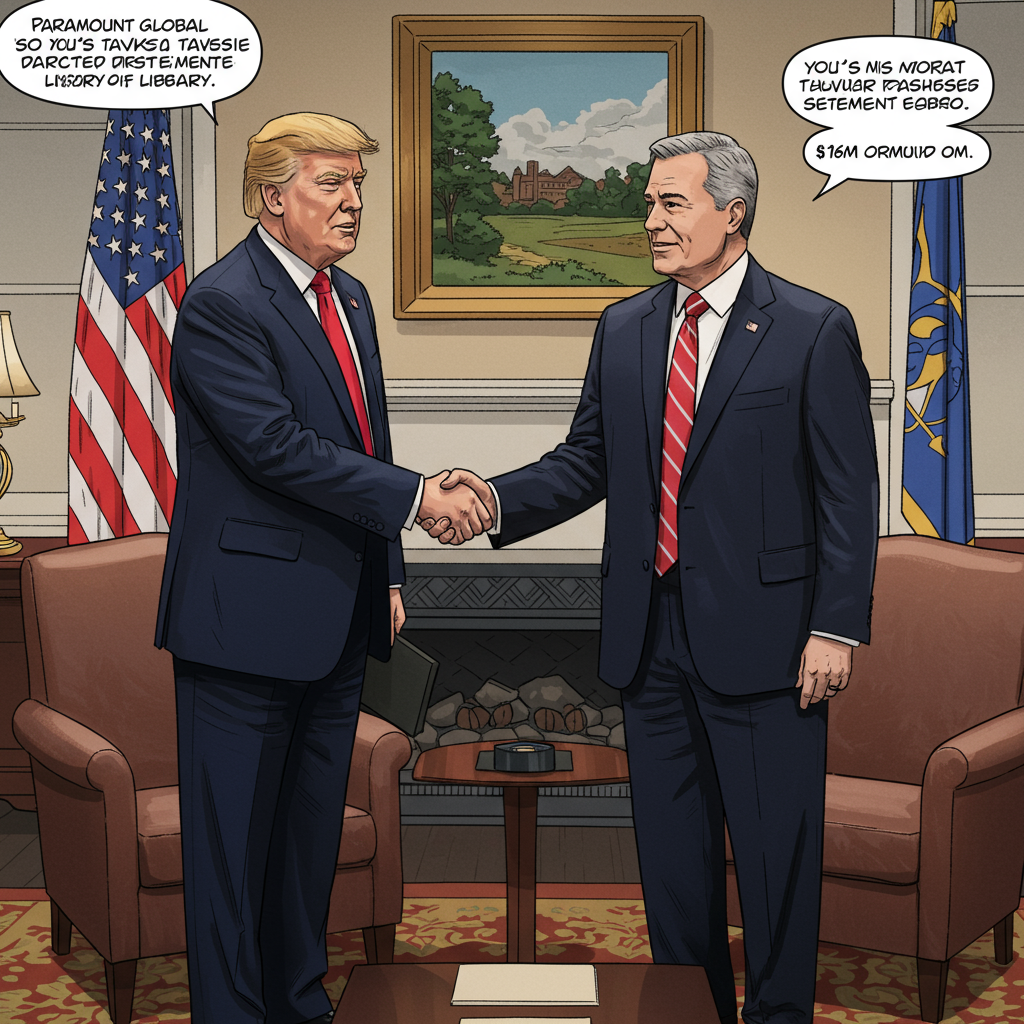In a significant legal development for the media industry, paramount Global has finalized a settlement with former President Donald Trump over a lawsuit concerning a “60 Minutes” interview featuring then-Vice President Kamala Harris. The agreement requires Paramount, the parent company of CBS, to pay $16 million. This substantial sum is explicitly designated for Trump’s future presidential library, with provisions ensuring the funds do not benefit Trump directly or indirectly. Notably, Paramount’s statement confirmed the settlement does not include any admission of wrongdoing, apology, or expression of regret regarding the broadcast or its editing.
This Paramount settlement with Trump marks the latest instance of a major media corporation reaching an agreement with the former president, who has become increasingly litigious towards outlets he perceives as biased or unfair. The resolution comes after months of legal maneuvering and mediation, highlighting the complex interplay between media operations, political disputes, and corporate business objectives. The terms of the deal also include a commitment from “60 Minutes” to release transcripts of future interviews with major U.S. presidential candidates, subject to necessary legal or national security redactions.
The Core of the Legal Dispute
Donald Trump initially filed the lawsuit against CBS in October, seeking a staggering $10 billion in damages. This claim was later increased to $20 billion in an amended complaint filed in February. The central allegation was that the network had deceptively edited an interview with Kamala Harris that aired on “60 Minutes.” Trump’s legal team contended this editing was performed to unfairly “tip the scales” in favor of the Democratic Party during the election cycle. The suit, filed in a federal court in Texas, specifically cited instances where CBS aired what appeared to be two different versions of Harris’s response to a question about the Israel-Hamas conflict.
CBS and Paramount consistently denied these allegations, asserting the lawsuit was “completely without merit.” They argued that the editing was a standard journalistic practice used for conciseness and that the unedited footage supported the accuracy of Harris’s quoted remarks, even if her original answer was circuitous. The network had actively sought a dismissal of the case, defending its editorial judgments as protected speech.
Why Paramount Chose to Settle
Despite CBS’s strong defense and legal observers widely expecting the case to be dismissed, Paramount ultimately agreed to the $16 million settlement. A primary driver behind this decision was the company’s pending $8.4 billion merger with Skydance Media. This significant corporate transaction requires approval from various regulatory bodies, including the U.S. Federal Communications Commission (FCC), which oversees broadcast licenses.
The lawsuit had become a notable obstacle to securing this crucial approval. FCC Chairman Brendan Carr, appointed by Trump, had taken the unusual step of opening an inquiry into whether the “60 Minutes” edits constituted “news distortion,” requesting raw footage and transcripts from CBS. This inquiry signaled potential regulatory hurdles for the merger. Paramount’s controlling shareholder, Shari Redstone, reportedly advocated strongly for the settlement, viewing it as essential to clearing the path for the Skydance deal amidst mounting corporate debt and pressure to finalize the sale. Settling was seen as a necessary step to mitigate regulatory risk and expedite the merger process.
Settlement Terms Beyond the Monetary Payment
The Paramount-Trump settlement involves more than just the financial payout directed to Trump’s future presidential library. A key non-monetary term mandates that “60 Minutes” will release transcripts of interviews with future eligible U.S. presidential candidates after they are broadcast. This new policy, while subject to redactions for legal or national security reasons, represents a concession regarding transparency in political news coverage following the dispute.
The settlement also includes a broad release of claims by Trump against CBS related to any reporting up to the settlement date. This provides Paramount a degree of legal closure concerning past coverage referenced in the lawsuit. The agreement’s specific wording, confirming no apology was given, highlights Paramount’s effort to settle the case without explicitly validating Trump’s core claims about deceptive editing or political bias.
Broader Context and Industry Reactions
The Trump lawsuit against CBS and its subsequent settlement occur within a larger pattern of legal challenges brought by Donald Trump against media organizations. Just months prior, Walt Disney-owned ABC News settled a defamation case filed by Trump, which included a $15 million contribution to his presidential library and a public apology for an anchor’s inaccurate statement. Similarly, Meta Platforms, the parent of Facebook and Instagram, reached a $25 million settlement with Trump over the suspension of his social media accounts after the January 6, 2021, Capitol incident. These instances demonstrate a recurring strategy by Trump to utilize legal action, often under novel legal theories, to confront media outlets and social platforms.
The lawsuit against CBS specifically utilized the Texas Deceptive Trade Practices-Consumer Protection Act, bypassing traditional defamation standards that are typically more challenging for public figures to meet. This legal approach is viewed by some experts as an attempt to lower the bar for challenging news organizations in court.
Internal Turmoil and Journalistic Concerns
The settlement reportedly caused significant disruption and concern within CBS News, particularly at “60 Minutes.” Journalists and producers accustomed to routine editing practices viewed the settlement as a concession under corporate and political pressure. The situation is linked to the recent high-profile resignations of “60 Minutes” Executive Producer Bill Owens and CBS News President Wendy McMahon, both reportedly opposed to the settlement agreement.
Longtime CBS News correspondent Scott Pelley publicly commented on the impact, suggesting increased corporate oversight influenced journalistic independence. Media advocacy groups, like the Freedom of the Press Foundation, a Paramount shareholder, have criticized the settlement, labeling the lawsuit a “shake-down” and expressing intent to challenge the agreement’s implications for the First Amendment and press freedom. These reactions underscore the tension between business interests, political pressure, and the operational independence of news divisions.
Frequently Asked Questions
Why did Donald Trump sue CBS/Paramount over a Kamala Harris interview?
Donald Trump’s lawsuit alleged that CBS deceptively edited a “60 Minutes” interview with Kamala Harris in October. He claimed specific edits of her response to a question about the Israel-Hamas conflict were made to make her appear more favorable and competent. Trump contended this editing was a “partisan and unlawful act of election and voter interference” designed to influence election outcomes, causing him harm. He initially sought $10 billion, later increasing the claim to $20 billion.
What are the key details of the Paramount settlement with Trump?
The settlement requires Paramount Global to pay $16 million, which will go to Donald Trump’s future presidential library and not to Trump personally. Paramount stated the settlement does not include an apology or admission of regret. Additionally, as part of the agreement, “60 Minutes” will begin releasing transcripts of future interviews with U.S. presidential candidates after they air, with provisions for necessary legal or national security redactions.
What are the broader implications of this settlement for CBS and journalism?
The settlement is seen as a significant development driven partly by Paramount’s need to secure regulatory approval for its merger with Skydance Media, as the lawsuit had become a hurdle. It has sparked concerns within CBS News and the broader journalistic community regarding corporate pressure influencing editorial decisions and potential precedents for future legal challenges against media outlets using novel legal strategies like consumer protection laws. The settlement also follows a pattern of Trump pursuing lawsuits against media companies over unfavorable coverage.
Conclusion
The Paramount settlement with Trump represents a resolution to a high-stakes legal battle rooted in claims of biased news editing. While Paramount avoids a protracted court fight and potentially clears a path for its critical merger, the $16 million payment and the agreement to release future candidate transcripts raise complex questions for the media landscape. It highlights the increasing legal pressure faced by news organizations, the influence of corporate objectives on editorial decision-making, and the ongoing debate surrounding fairness and bias in political reporting. The case underscores Donald Trump’s continued use of legal action against media outlets, setting a precedent that could influence how similar disputes are handled in the future.


